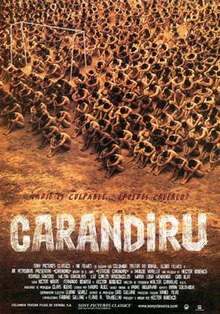Carandiru (movie)
| Carandiru | |
|---|---|

Theatre release poster
|
|
| Directed by | Héctor Babenco |
| Produced by | Héctor Babenco Oscar Kramer |
| Written by | Héctor Babenco Fernando Bonassi Victor Navas Story: Dráuzio Varella |
| Based on |
Estação Carandiru by Drauzio Varella |
| Starring |
Luiz Carlos Vasconcelos Rodrigo Santoro Wagner Moura |
| Music by | André Abujamra |
| Cinematography | Walter Carvalho |
| Edited by | Mauro Alice |
| Distributed by |
Sony Pictures Classics Globo Filmes |
|
Release date
|
|
|
Running time
|
147 minutes |
| Country | Brazil Argentine Italy |
| Language | Portuguese |
Carandiru is a 2003 Brazilian drama film directed by Héctor Babenco. It is based on the book Estação Carandiru by Dr. Drauzio Varella, a physician and AIDS specialist, who is portrayed in the film by Luiz Carlos Vasconcelos.
Carandiru tells some of the stories that occurred in Carandiru Penitentiary, which was the biggest prison in Latin America. The story culminates with the 1992 massacre where 111 prisoners were killed, 102 by Police. The film was the last thing for which the prison was used before it was demolished in 2002, one year before the release of the film.
Babenco states that Carandiru is the “most realistic film [he’s] ever made,” presenting a new kind of Brazilian realism inspired by Cinema Novo (not only is it meant to portray different sides of Brazil, but also it was shot on location and used many actual prisoners as actors). Due to this focus on portraying reality and the film’s memoir inspiration, Carandiru can be read as a docudrama or as a testimony from the prisoners.
This episodic story is set in São Paulo's notorious prison Carandiru, one of Latin America's largest and most violent prison systems.
Carandiru tells the stories of different inmates at Sāo Paulo’s Carandiru Penitentiary through the filter of Dr. Varella, who goes to the prison to test the inmates for HIV. Similar to many Brazilian crime films, Dr. Varella narrates Carandiru, however, it is not his story that is told. He (like Buscapé in City of God) acts as a filter for the stories of those that cannot speak.
The inhumane conditions of the prison, such as the 100 square foot cells inhabited by sometimes up to 16 prisoners, are shown, as well as the lack of control that the guards have. Order in the prison is entirely controlled by the prisoners themselves, which leads them to face problems such as murders, rampant drug use, and disease all within the prison.
...
Wikipedia
